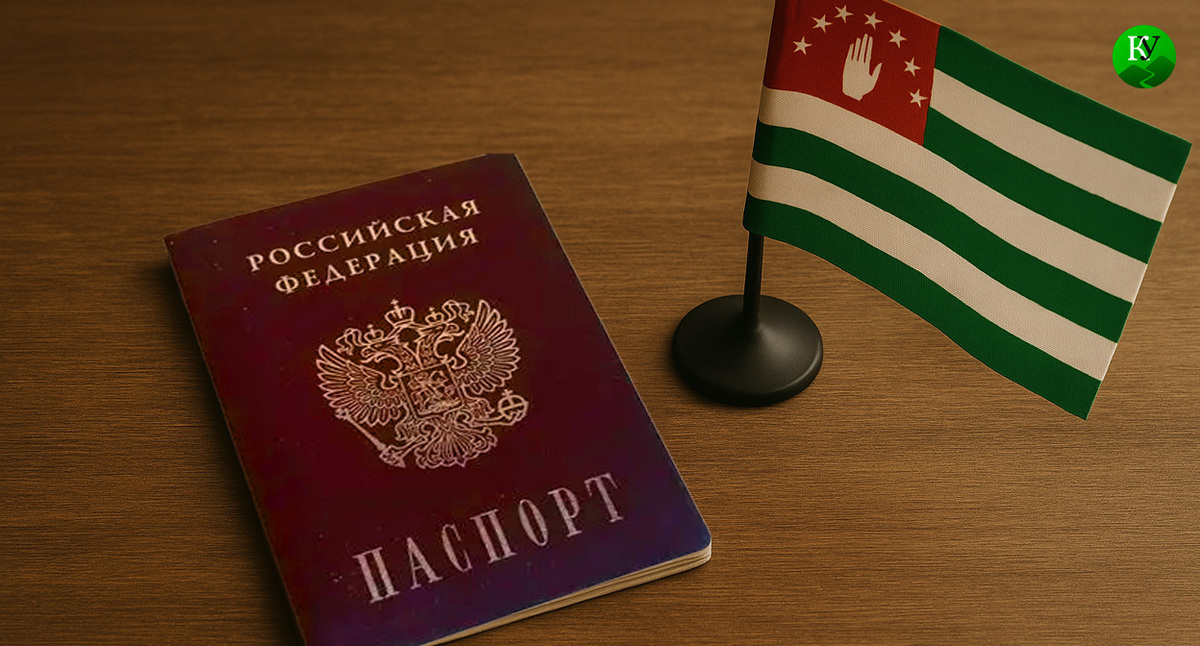"Wonderful activity." How an Azerbaijani journalist became a beekeeper
Beekeeping in Azerbaijan
It’s six in the morning. We’re waiting for Elvin at the Baku bus station to head to Yevlakh.
Elvin Bayramli is a journalist, but for many years he’s been busy with a completely different business — beekeeping. And this is why we’re going to Yevlakh. We want to see his bees, to get to know this other side of our colleague’s life.
- Cows, war and faith: story of a Krishna devotee farmer from an Azerbaijani village
- All you need to know about Georgian wine boom
- Mystery of Zargava: the hidden history of Azerbaijani village
Nomadic bees — from the mountains to the plains
“We are completely dependent on nature up here. If there isn’t much food, we’re forced to transport the bees to other places. In beekeeping every hour counts. If need be, in the evening we collect our things and hit the road. If you are late, or go too fast, you can hurt the bees. We check the number of bees, and if it’s decreased, that means they don’t have enough food or perhaps none at all, and we immediately move,” Elvin says.
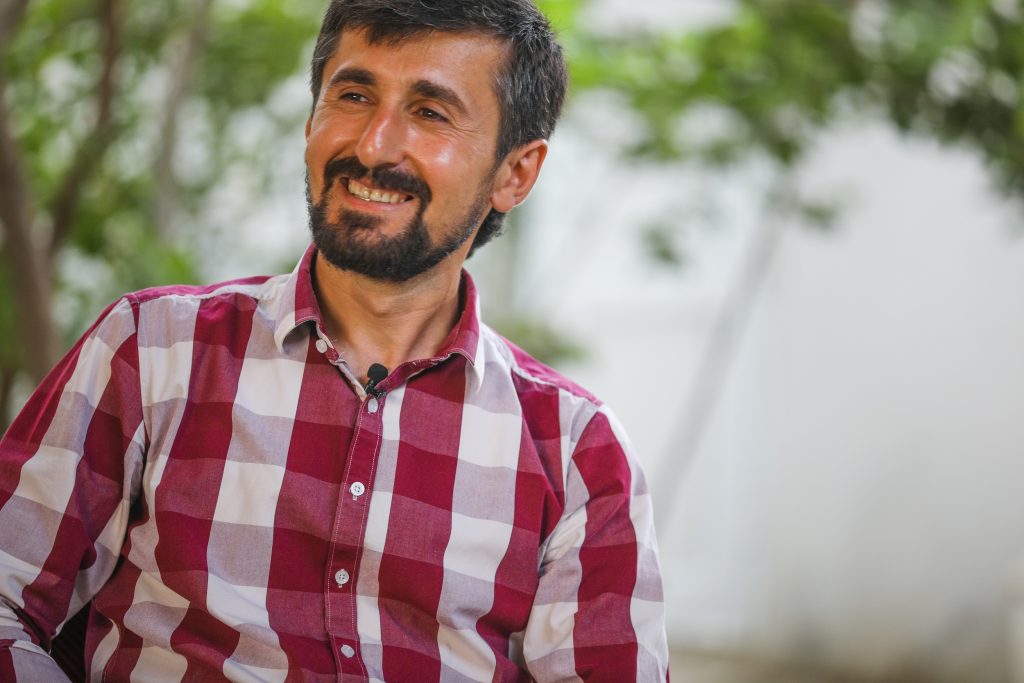
At first we thought that we would meet Elvin in his native region of Agstafa. His bees live mainly in the villages of Muganly and Kekhnya Gyshlag in the Agstafa region, 500 kilometers from Baku. But this summer there was a lot of rainfall, with virtually no flowers left. To prevent the bees from starving they were transported to Yevlakh, 300 kilometers from Baku.
Elvin lives with his wife and two children in the village of Albalylig (Vishnevka) on the outskirts of Baku. At least once a week he goes to his farm to visit the bees. On this occasion, we went along.
We arrived at our destination at 10 am. Even though it was still early, the sun was already blazing, at least 40° in the shade, not that finding shade on the steppe is an easy task. But plants grow on the plains whence bees collect nectar — camelina, comb, wormwood, etc.
“It is very hot in the plains in summer. So I go early in the morning to finish up before noon, then head back. It doesn’t compare with our mountain villages in terms of beauty, but this summer we just couldn’t leave the bees there,” Elvin rues a bit.
Choosing a profession out of a sense of protest
I met Elvin about ten years ago in the course of a media project. He gave the impression of an enthusiastic enough young journalist with a good future. He worked at one of the main news agencies of the country.
He says that he didn’t plan to choose journalism. After completing his studies in high school, he entered the law faculty at a private university, but dropped his studies after the first semester. He re-passed the entrance exam the same summer and this time entered the faculty of journalism at Baku State University.
From a young age, Elvin’s motivation has been a sense of protest.
“In high school I thought that I would go to Baku, I would protest against everyone, organize rallies. I wanted to protest at the French embassy. If you remember, at the time there was an event in the Parliament – “Jacques Chirac went mad”, Elvin relates with a laugh. [In 2000, a member of the Azerbaijani parliament, Shamil Gurbanov, sharply criticized the President of France for the pro-Armenian position of his country – JAMnews]
“In the village we mostly watched state television channel AzTV. Other TV channels seemed like offshoots of this channel.
And on all these channels they talked about France’s support for the Armenians. And I, a 17-year-old boy, was nervous. A protest in front of the French embassy was proposed.”
“So you protested in front of the embassy?” I ask.
“No, I didn’t [laughs]. There were other protests in the form of articles. We also participated in several rallies. With friends we created a student organization at the university.”
“A beekeeper among journalists, a journalist among beekeepers”
At some point Elvin developed a love for journalism, but four years of study at university gave him practically nothing. So after completing his studies, he joined the military. Then he took part in several media projects of various international organizations.
He says that he mainly studied professional journalism during these projects. He also began working at a new agency. However, he says he failed to apply what he learned in international journalism in local media.
“I like when the material is written well, fairly, impartially. In the place where I worked, this was not the case. There were of course other problems, mainly financial.
“I don’t know, maybe in another country I would’ve become a professional journalist, I wouldn’t have thought about beekeeping. Maybe if those international projects had gone on longer, I would have become more professional as a journalist.
“It didn’t work out, and I felt there was a niche for me in beekeeping. Now I am known as a beekeeper among journalists and as a journalist among beekeepers.”
Elvin is the press secretary of the Azerbaijan Beekeepers Association. By introducing society to the problems of beekeepers, he tries to advocate for and protect their rights. He also manages his own brand, “Balchy” (Beekeeper). The Balchy website not only offers products, but also interesting content in the form of articles, photos and videos on beekeeping.
What is like starting a business in Azerbaijan?
On the subject of Balchy, I ask Elvin how hard it is to create a new brand in Azerbaijan.
“Well, Balchy is a small family business, but it can be called successful. In spite of not being from this area and the customer base being rather small, it’s safe to say we have had some success.
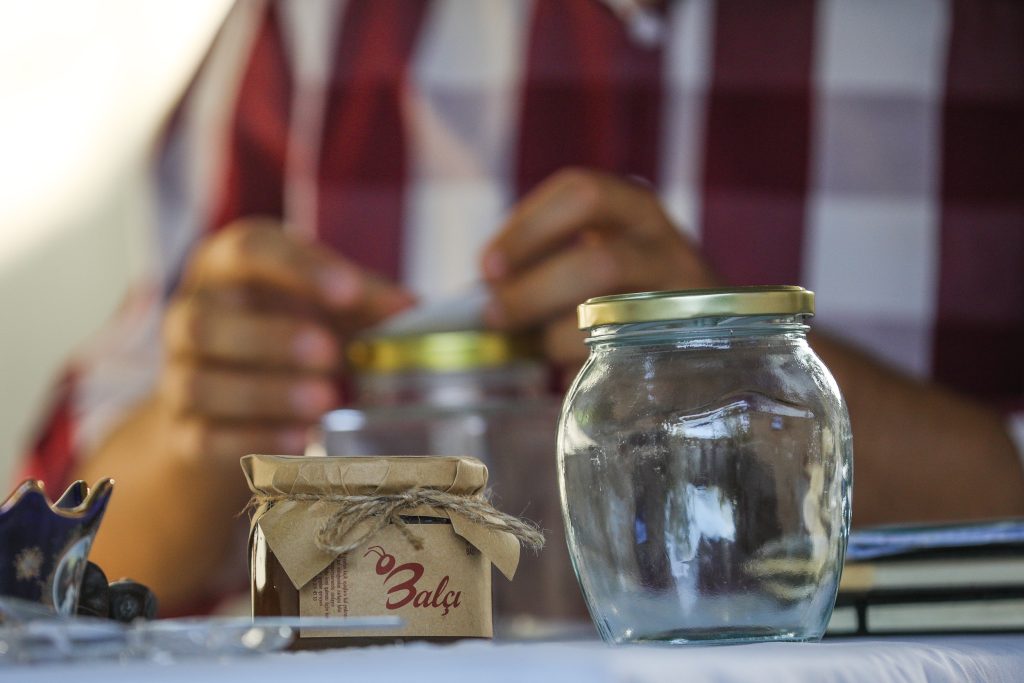
Elvin says that his father wanted him to help with beekeeping from the very beginning.
“I grew up in a family of beekeepers. Every year my father said that I needed to help him with selling honey. I thought, how can I sell honey? A journalist can’t sell honey. I thought honey was sold in the market, and didn’t imagine myself a small salesman.
“Once on Facebook I saw a honey company packaging their products, and I liked it. I thought I could do it too. So I started asking friends what to name my business, how to come up with a design for packaging, where to find jars? The name of the brand, the creation of a website, pages in social media — all this was difficult for me, but little by little it came together.”
People don’t trust beekeepers
Beekeeping demands a lot of effort. Problems are innumerable. Elvin tells me that one of the biggest problems is distrust of beekeepers.
“Beekeepers check their honey at the food safety agency and receive a certificate. When you show this document to the buyer, he tells you that anyone can get that. There is distrust because honey is the most difficult product to verify.
“For example, a young honey seller faces some age discrimation. In Azerbaijan, honey buyers are mostly older people. If ten honey sellers line up at the fair, the older shoppers look for older sellers. And when they see a man of 30-35 years old, they say that he is too young, how can he be any good at beekeeping?
“In their minds, the beekeeper is an elderly man in a worn-out suit, his apron is stained with honey, and after he filling the jar with honey, he licks the honey from his fingers.
“And when you offer neatly poured honey in specially purchased jars, packed with special cellophane, with labels, you’re wearing a neat apron and even wearing gloves, they won’t buy from you. Nobody in Azerbaijan wants to buy honey in the markets.”
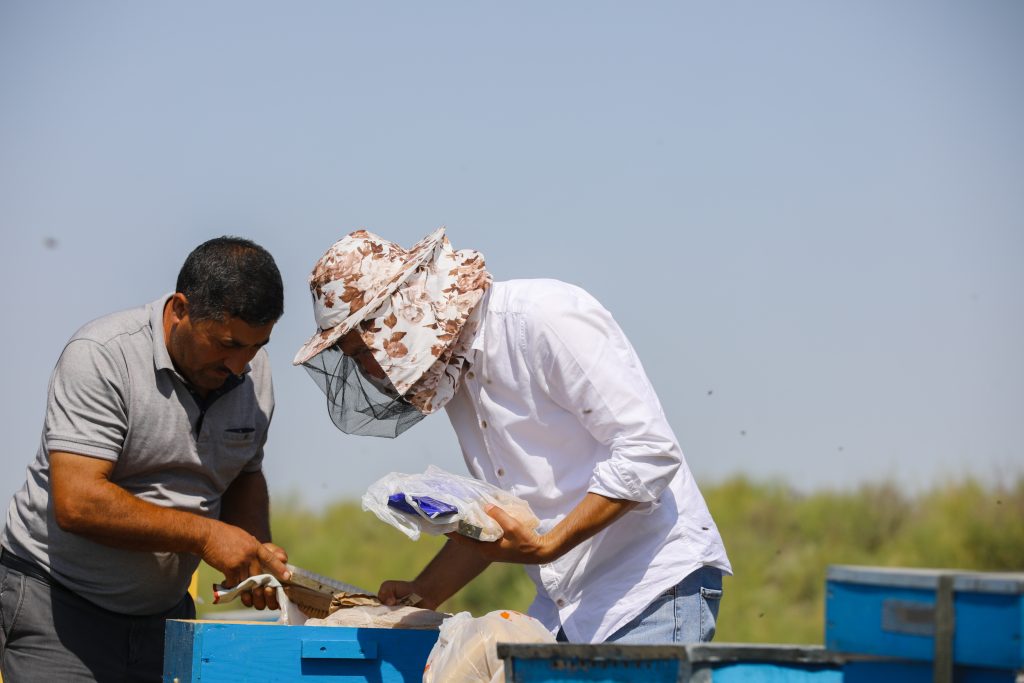
How to find natural honey?
At some point, you may have wondered how to identify natural honey on sight. According to Elvin, there are many ways for people to recognize the naturalness of honey, but in reality there is only one way — the laboratory.
“Some people believe that their taste apparatus is worth a million dollars. As soon as they try honey, they immediately decide whether it is natural or not. But if it were possible to determine the naturalness of honey this way, then why do countries spend millions in order to create laboratories for this business?
“I once watched a film about bees on the BBC. In a laboratory the size of a village, they were testing honey coming from various countries. Expensive place. There, a woman said that we annually check the honey supplied from China. We find some mistake, and next year Chinese beekeepers make completely different, fake honey. While verification is in progress, time passes, and during this time people use the same fake.
“In our country, even the best laboratories are not able to determine the naturalness of honey 100%, with a total absence of other impurities. Even if they can, it is done with great difficulty. So if someone claims that by tasting he can identify real honey, he is mistaken.”
“And what do the terms “pure” and “fake” honey really mean?” I ask Elvin. He replies that bees collect pure honey from the nectar of flowers, leaves, and the secretions of certain insects collect between leaves. Then the bees ferment the collected product, the water evaporates, this sweet mass is given in a ratio of 17 to 21 and collected in small combs.
Fake honey is obtained in two ways: the first is when bees are fed with sucrose and sherbet, so the bee is turning industrial sugar into honey. The second method is the usual boiling of sugar with the addition of substances that give the color and taste of honey. Both of these types of honey are not only not useful, but can also harm the human body.
Elvin advises those in doubt to contact private laboratories. Testing is not very expensive, he says.
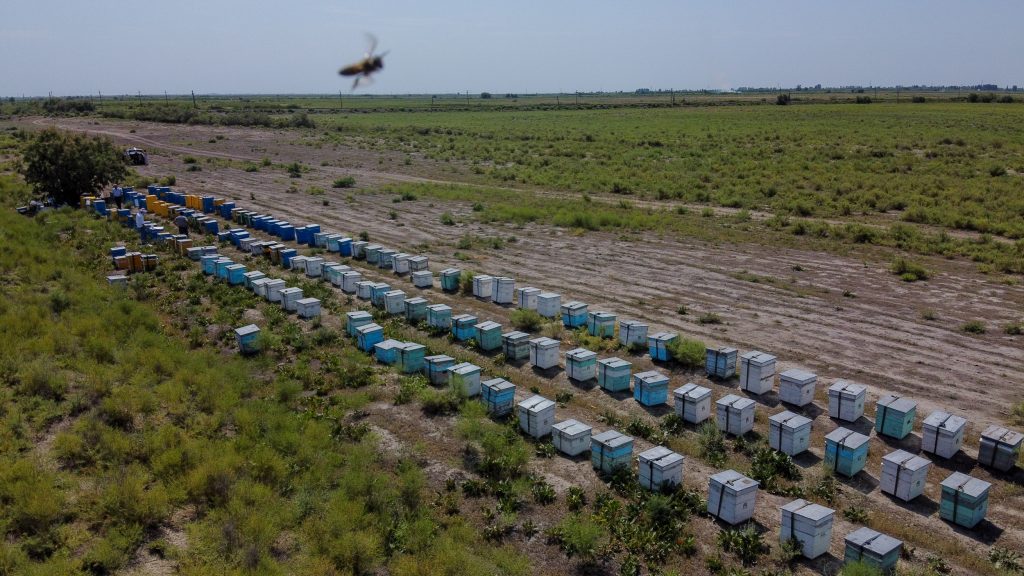
Barriers
According to a beekeeper colleague, there’s a number of obstacles in the way of developing beekeeping in Azerbaijan. For example, the extinction of indigenous Caucasian bees after the collapse of the Soviet Union. Azerbaijani beekeepers currently buy bees from abroad. Genetic selection has already begun in the mountainous regions of the country, but the process takes time.
“In addition, we do not have professional beekeepers-breeders. There are few types of medicine against diseases of bees. There is no bee vet. Imagine, all the veterinarians in the country studied the treatment of livestock, chickens, and beekeepers do not have their own veterinarian. There are few beekeepers who studied abroad, among the youth there’s none at all. When we talk about beekeeping, we mean people who have learned this business on their own, in practice. There is obviously no scientific center,” says Elvin.
He maintains that the state should create institutions to support beekeeping, but so far there is nothing of the sort.
“Not so long ago, our association of beekeepers made an agreement with a university in Turkey. They make different mixtures of honey on a scientific basis to study the beneficial properties, the ratio of ingredients, or establish under what conditions and for how long these products can be stored.
“And they offer ready-made recipes to their beekeepers toward a final product. For this, they take a symbolic amount from them, say 50 manats [about $30] for the sale of honey worth 10,000 manats [about $5,900]. They can also accept some equipment as a gift for the recipes. We are already preparing mixtures of honey with products such as nuts, dried fruits, ginger, etc., based on those recipes.”
In connection with this, Elvin follows the work of German, English, and Russian beekeepers, collecting information. I also bought special equipment for the production of dried fruits.
“All this is difficult for us from a financial point of view. I got a lot of loans. Let’s say we’ve made some product, who should we give it to to be verified? What are its good qualities? How and how much to store? We must do all this ourselves. From scratch”.
“Kelbajar honey” thirty years later
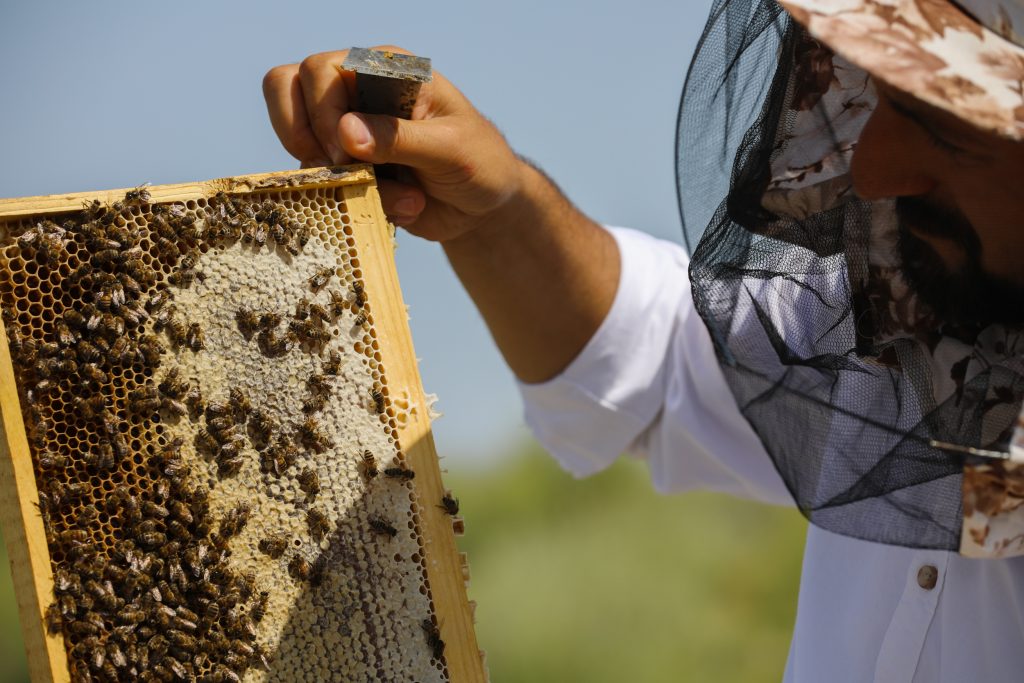
The reduction of feeding areas for bees has become another problem for beekeepers. The uprooting of a strip of plants along the Kura, the razing of forests in villages without gas in order to obtain firewood, and many other scenarios make beekeeping a precarious venture.
Elvin says another reason for the absence of a food base for bees was the occupation of Karabakh for many years.
“Karabakh was the largest and best food base for beekeeping in Azerbaijan. The Karabakh school of beekeeping has always been considered the most advanced in Azerbaijan. During the years of occupation, the Sheki-Zakatala zone was paradise.”
After the 44-day war in 2020, when control over the territory again passed to Azerbaijan, bee farms began to spring up there. Elvin’s biggest dream right now is to move his bee colonies to one of the liberated areas. But this is impossible, because he is not from Karabakh.
“Last year, several families of bees were moved to the Kalbajar and Lachin areas. And this year, all residents of Karabakh can bring their bee colonies to Aghdam, Shusha and Khojavend (Martuni), to other places where it is allowed. But the beekeeper must have at least fifty bee colonies and subsidies, i.е. registration [as a resident of the former Nagorno-Karabakh Autonomous Republic – JAM]. I do not agree with this decision, I even objected formally. I was told that the decision had been made in the presidential office.
I understand that there are problems there — with leftover mines and ignorance of the terrain, you can easily get lost and end up on the side of the enemy; there are still separatists, Russian peacekeepers. But it was necessary to give permission to another five to ten beekeepers from outside areas. They are doing good work, they have plans for the future, they have their own products on the market. I wanted to be part of it, but they didn’t agree.”
Despite all this, Elvin has introduced a product called “Kelbajar Honey”.
“This is not my honey; I bought it from another beekeeper who moved his bees to Kalbajar. This is the only product made in Kalbajar with this designation on the label in thirty years. I ordered special expensive jars from abroad, made a special design, packed and wrote on the label “Kelbajar honey”. Now I have a plan to make a collection of honey produced in different regions of Karabakh. We are currently working on this with a designer I know.”
The only area that did not fall victim to monopoly
In Elvin’s opinion, beekeeping, in all likelihood, is the only area of the national economy that has not fallen victim to monopoly. And the reason for this is the specificity of this occupation.
“The largest Azerbaijani food production company has been trying for years to start producing honey, without success. You can sow hectares of corn, entrust this business to some agronomist, give him a good salary, and there will be results. But this is not possible in beekeeping. The beekeeper must himself stand behind his work. It is impossible for someone to look after the bees for you.
“For example, I have a separate farm from my father. I call him and ask him to do something. Of course, he wants his son to do better than himself. But even he can’t do what I do with my bees. For this reason officials, ministers, and oligarchs do not make large investments in beekeeping. Because they won’t be there watching production. This is a very complex, specific area. Therefore there is no monopoly,” Elvin concludes.
Unstable cost and stable price
A kilogram of honey now costs 30 manats [about $18]. About two or three years ago, it cost 25 manats [about $15]. While other products are growing in price rapidly, the price of honey is mostly stable.
“Other products have gone up in price, maybe three or four times. And honey has risen in price by 10-20%, no more. And the cost is different. It may be that the cost of a kilogram of honey will be 10 manats [about $6], or maybe even 25 [about $15]. Depends on the time of year, on the yield. You can earn three to five manats for each kilo of honey, or you can earn 10-20. It all depends on nature, how the weather will behave.”
“Big plans for beekeeping”
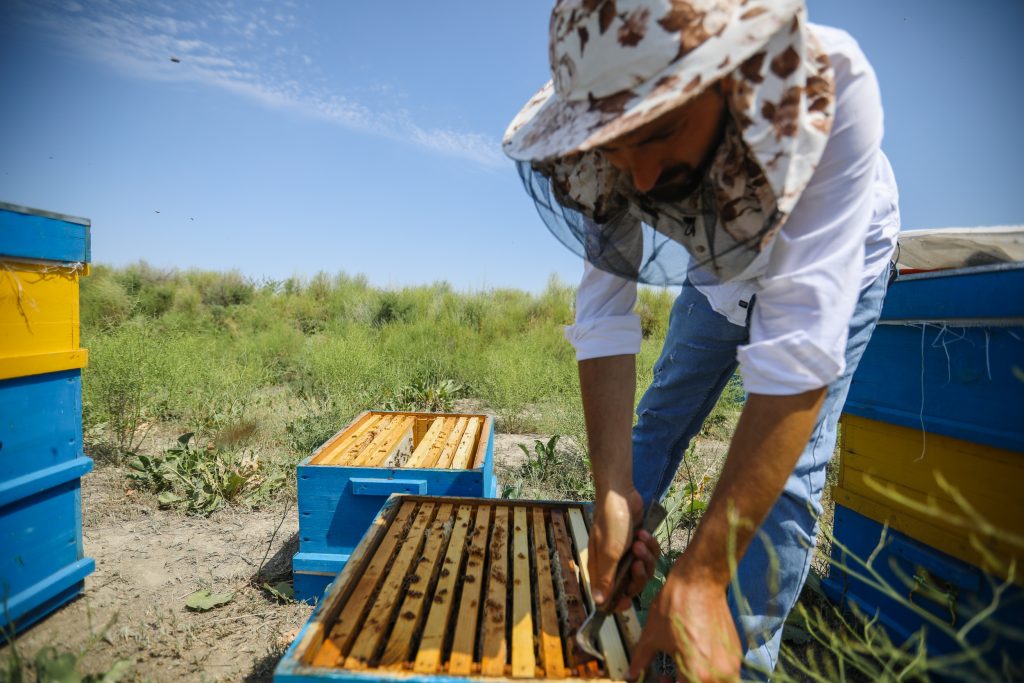
I ask Elvin about the likelihood returning to journalism. He says that even now he feels like a journalist.
“When I see an event, I want to film it, write about it, tell people that such-and-such happened. I dream of taking up photography if I ever have free time. But I think that beekeeping is more appropriate for me. I have big plans for this.
“It’s a wonderful activity. Sometimes I lie in the shade for hours, the bees work, I watch them and all my stress is gone. Listening to them while you work is a great sound, a great feeling, and the process itself is great.”
Supported by RLNE

















